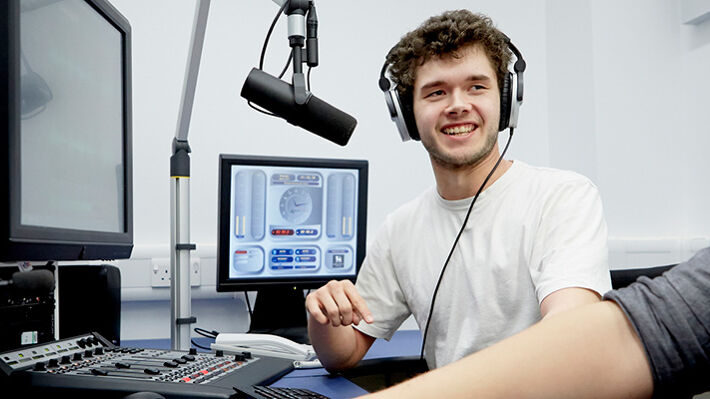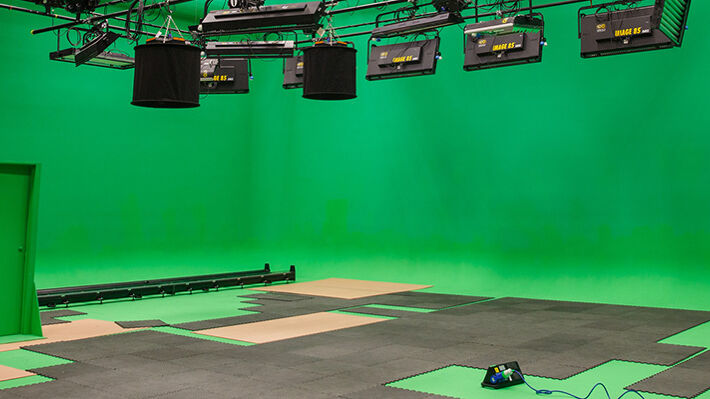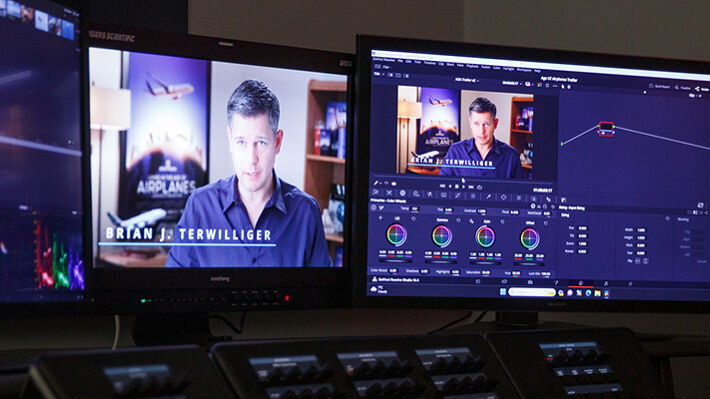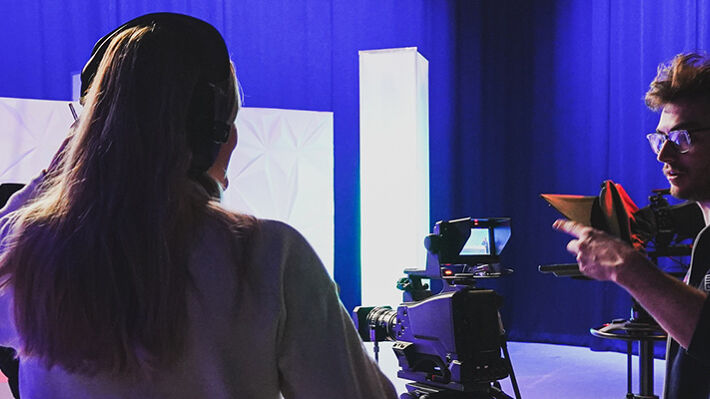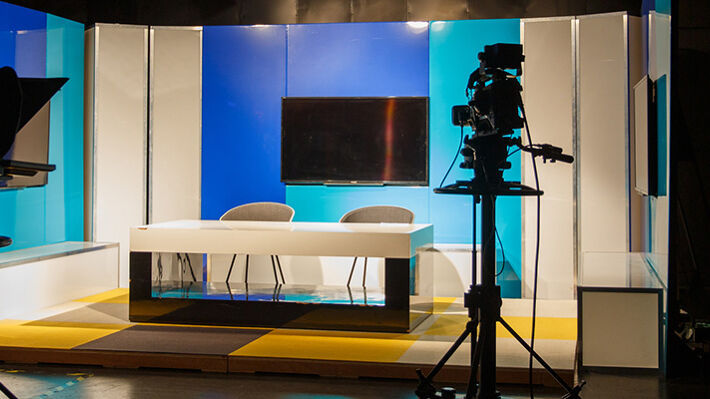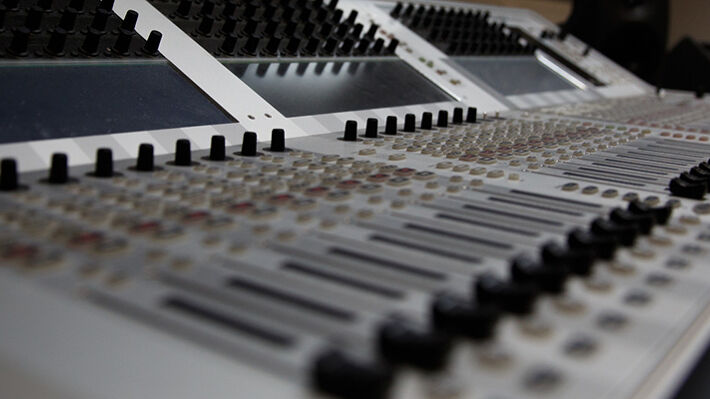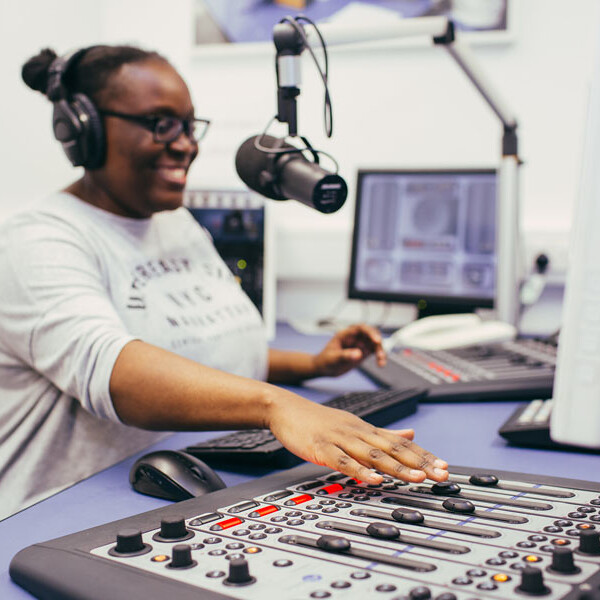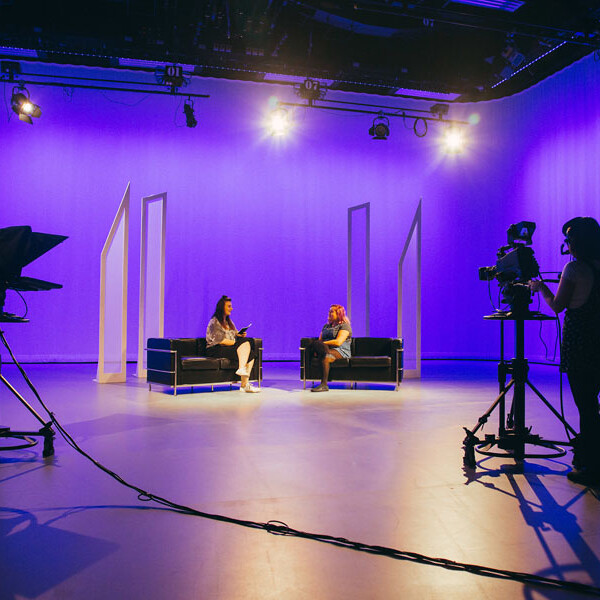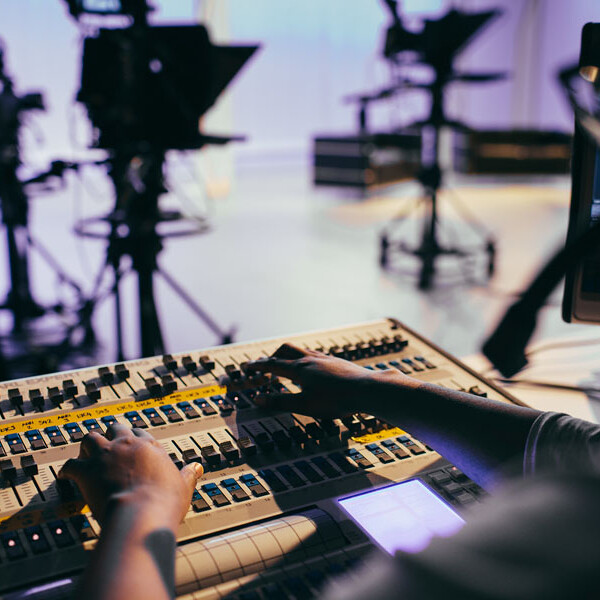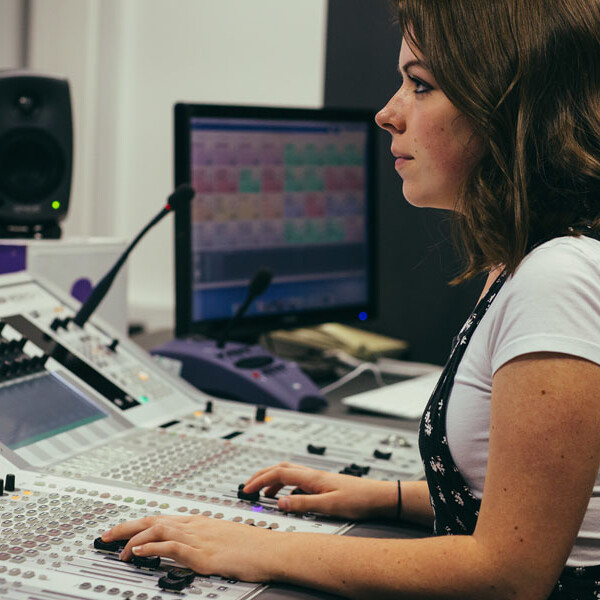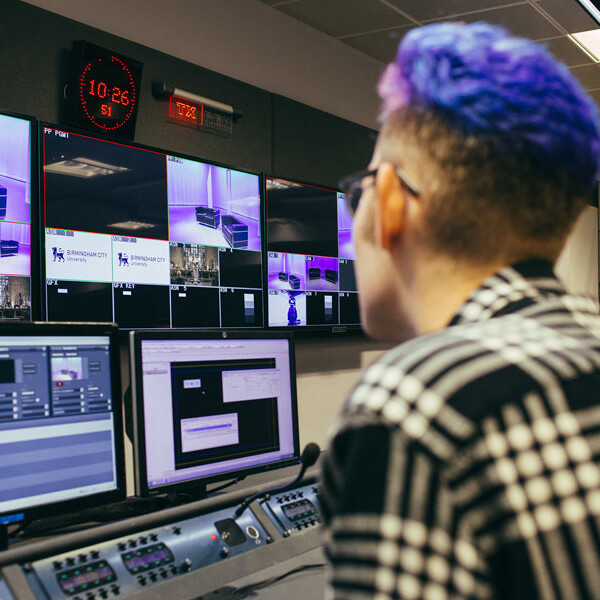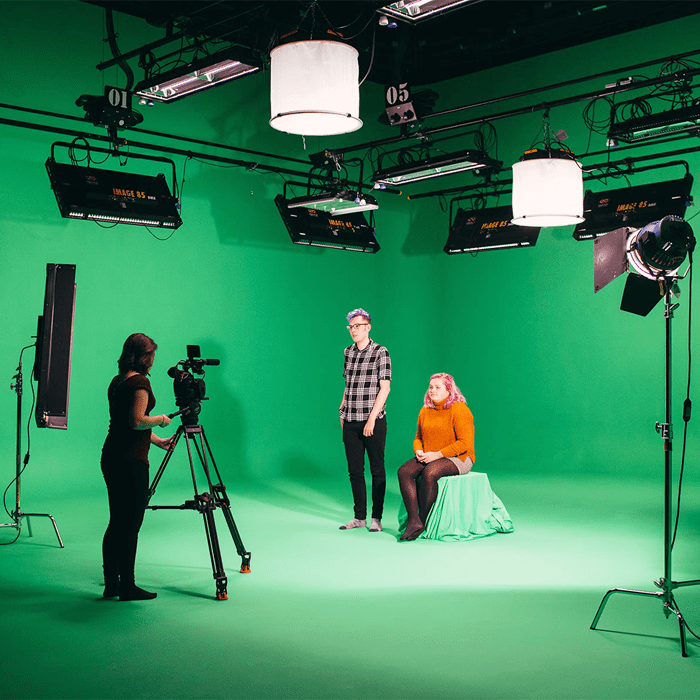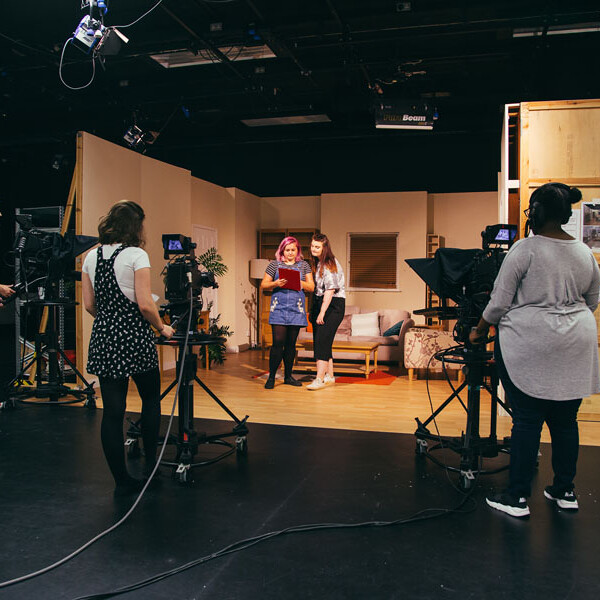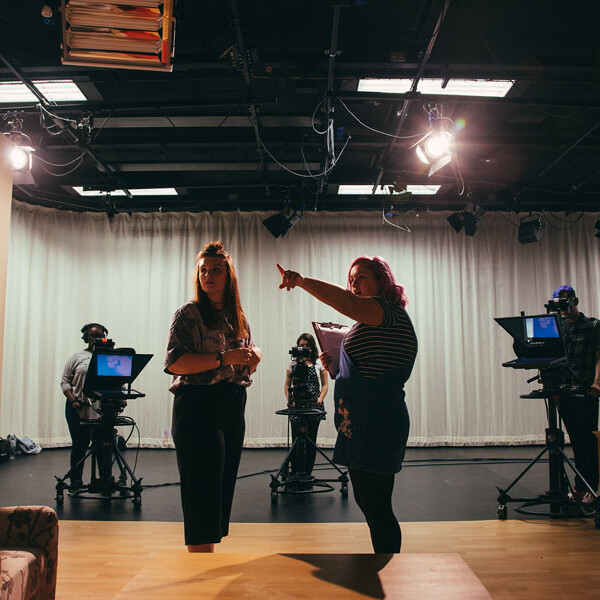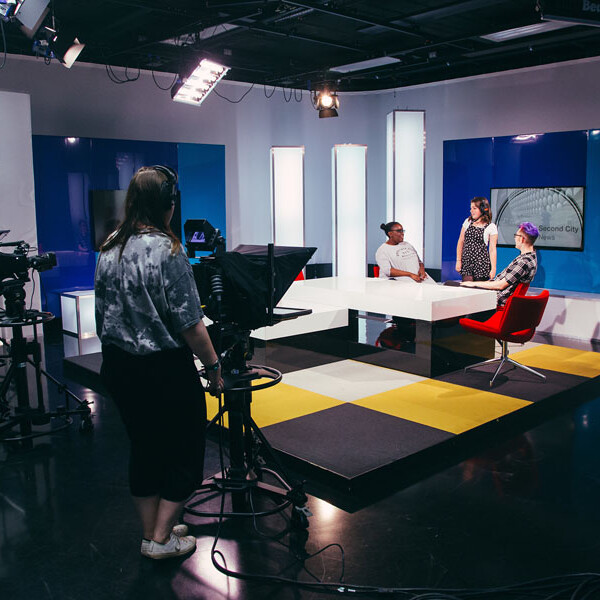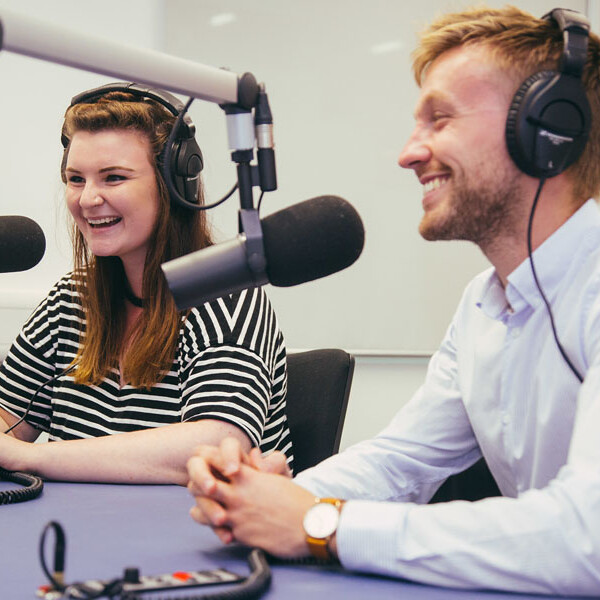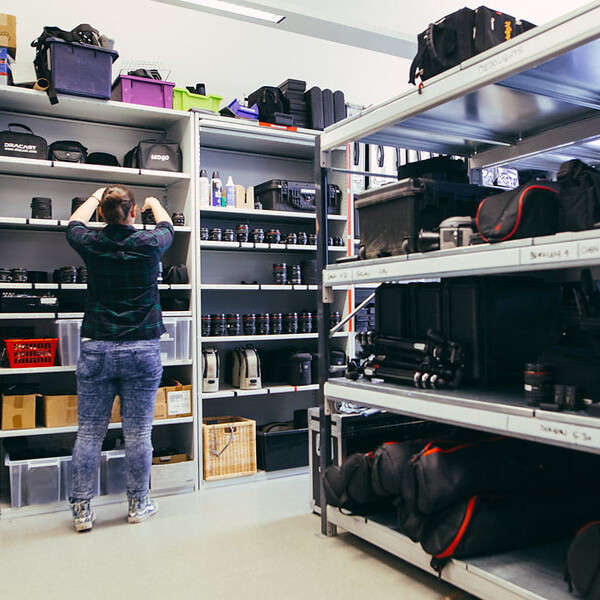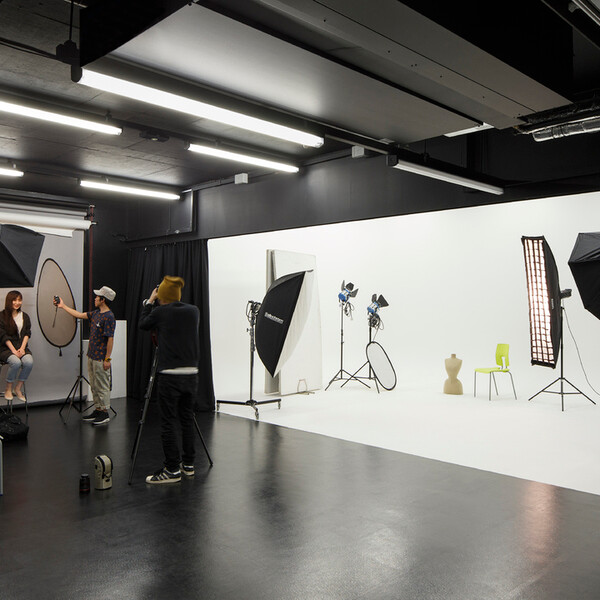Media Production - MA
Currently viewing course to start in 2025/26 Entry.
This master's course is designed to equip you with the professional skills necessary to succeed in the digital media production industry, while grounding your knowledge in production theory. For those who already have industry experience, or are looking to change career path, the course provides the chance to learn additional skills and apply professional media practice to your existing resume.
- Level Postgraduate Taught
- Study mode Full Time
- Award MA
- Start date September 2025
- Fees View course fees
- Subject
- Location City Centre
This course is:
Open to International Students
Overview
Scholarships are available for this course. Find out more and apply now
This master's course is designed to equip you with the professional skills necessary to succeed in the digital media production industry, while grounding your knowledge in production theory.
For those who already have industry experience, or are looking to change career path, the course provides the chance to learn additional skills and apply professional media practice to your existing resume.
What's covered in this course?
You will gain a comprehensive understanding of visual and audio mediums and their ongoing evolution. The course embeds professional practice throughout its curriculum, preparing you for careers across a range of digital media, including contemporary online platforms as well as established television and radio broadcasting. You will be encouraged to apply academic thinking to evaluate the current state of digital media, and critically reflect on your performance. Throughout your studies, you will be supported by experienced academic staff, such as documentary producer Sam Coley and television producer Emily Rushmer. You will have access to Adobe Creative Cloud applications and our state-of-the-art facilities at the Parkside campus, including radio and TV studios, VR and Motion Capture equipment, 360 Cameras, and audio and video editing suites. A full range of video and still cameras, lighting, and audio recording equipment will be available for hire, to help you complete your course work.
If you have an interest in video production, you will develop an in-depth understanding of production processes and explore online content development and distribution. Students with an interest in audio production will build skills in sound design, multitrack editing, and audio mastering, with opportunities to create podcasts, on-demand content, or traditional radio documentaries and features. The course includes training in live studio production and presentation skills, along with techniques for creating targeted content for social media platforms. The course encourages aspiring freelancers to develop their entrepreneurial and networking abilities to help launch a professional career. Specialist production modules are designed to mirror industry approaches, requiring teamwork for some assessments. This practical approach has enabled numerous recent MA students to transition seamlessly into professional production roles. The course provides a comprehensive blend of practical experience, theoretical knowledge, and professional development, to ensure you are well-prepared for a career in the digital media production industry.
I wanted to add academic skills to my practical skills - as up until now, everything I learnt in radio was self-taught. The supportive tutors have given me some unbelievable feedback and coming on this course has increased my employability.
David Morrissey
Why Choose Us?
- You’ll be taught by award-winning academic staff who have an accomplished track record in television and radio production and who continue to work in the industry.
- Regular guest speaker sessions give you the chance to learn from leading radio practitioners and build your industry networks.
- Our broadcast standard facilities are regularly used by media companies who incorporate our students into their activities through our paid ‘runners pool’.
- Our broadcast-quality television studios are supported by the latest editing, sound dubbing and colour grading equipment. You will be supported and trained by an excellent team of specialist technicians.
- Our digital radio studios use the latest audio production and programme scheduling tools.
- We offer extensive bespoke careers advice and encourage and support you to develop entrepreneurial skills, essential for a successful freelance career.
Similar Courses
OPEN DAY
Join us for an Open Day where you'll be able to learn about this course in detail, chat to students, explore our campus and tour accommodation. Booking isn't open for this event yet, register your interest and we'll let you know as soon as booking goes live.
Next Event: 28 June 2025
Entry Requirements
Essential requirements
Applicants are normally expected to have a minimum of a 2:2 honours degree, or equivalent, in media studies, media production, media communication, film and television studies, radio and audio courses, performing arts or theatre, public relations, journalism, English, creative writing and screen writing.
Prior experience of work in television, radio, online content production or other media related areas is useful, but not essential.
Your achievements should clearly demonstrate a keen interest in the field of media production and you are advised to read around the subject of media and to explore examples. Your application should demonstrate your ability to generate and develop ideas, as judged by the MA team.
We welcome non-traditional applications, particularly from applicants with substantial professional or production experience.
Applying with international qualifications
See below for further information on applying as an international student.
If you have a qualification that is not listed, please contact us.
Fees & How to Apply
UK students
Annual and modular tuition fees shown are applicable to the first year of study. The University reserves the right to increase fees for subsequent years of study in line with increases in inflation (capped at 5%) or to reflect changes in Government funding policies or changes agreed by Parliament. View fees for continuing students.
Award: MA
Starting: Sep 2025
- Mode
- Duration
- Fees
- Full Time
- 1 year
- £9,190 in 2025/26
- Full Time
- 18 months (including Professional Placement - see below*)
- £10,110 in 2025/26
International students
Annual and modular tuition fees shown are applicable to the first year of study. The University reserves the right to increase fees for subsequent years of study in line with increases in inflation (capped at 5%) or to reflect changes in Government funding policies or changes agreed by Parliament. View fees for continuing students.
Award: MA
Starting: Sep 2025
- Mode
- Duration
- Fees
- Full Time
- 1 year
- £18,600 in 2025/26
- Full Time
- 18 months (including Professional Placement - see below*)
- £20,460 in 2025/26
Application deadlines
We advise you to apply early to allow sufficient time for you to prepare to start your studies in September. Please apply by Friday 18 July to allow time to arrange accommodation, student finance and visas where required.
Late applications will be accepted where places are still available, but please note that Welcome Week begins on Monday 15 September 2025, and teaching begins on Monday 22 September 2025. International students are invited to arrive from Monday 8 September 2025.
To find out more, see our application timeline.
*Professional Placement option
The Professional Placement version of the course is optional and is offered as an alternative to the standard version of the course.
This will allow you to complete a credit bearing, 20 week Professional Placement as an integral part of your Master’s Degree. The purpose of the Professional Placement is to improve your employability skills which will, through the placement experience, allow you to evidence your professional skills, attitudes and behaviours at the point of entry to the postgraduate job market. Furthermore, by completing the Professional Placement, you will be able to develop and enhance your understanding of the professional work environment, relevant to your chosen field of study, and reflect critically on your own professional skills development within the workplace.
You will be responsible for finding and securing your own placement. The University, however, will draw on its extensive network of local, regional and national employers to support you in finding a suitable placement to complement your chosen area of study. You will also benefit from support sessions delivered by Careers+ as well as advice and guidance from your School.
Placements will only be confirmed following a competitive, employer-led selection process, therefore the University will not be able to guarantee placements for students who have registered for the ‘with Professional Placement’ course. All students who do not find a suitable placement or do not pass the competitive selection process will be automatically transferred back to the standard, non-placement version of the course.
Personal statement
You’ll need to submit a personal statement as part of your application for this course. This will need to highlight your passion for postgraduate study – and your chosen course – as well as your personal skills and experience, academic success, and any other factors that will support your application for further study.
If you are applying for a stand alone module, please include the title of the module you want to study in your Personal Statement.
Not sure what to include? We’re here to help – take a look at our top tips for writing personal statements and download our free postgraduate personal statement guide for further advice and examples from real students.
Course in Depth
Module
In order to complete this course you must successfully complete all the following CORE modules (totalling 180 credits):
This specialist production module explores the field of documentary production with an emphasis on working on-location. You will gain a professional understanding of the technical and editorial requirements which underpin the production of compelling visual and audio documentary content.
The module provides you with the core skills required to record on-location documentary content in varying conditions, including technical proficiency with cameras, microphones and lighting equipment. Presentation skills, content structuring and approaches to multitrack editing are also explored. You will develop the interpersonal skills required to effectively communicate with subjects, to gain trust and capture authentic content.
You will learn about the development of the documentary genre, including significant movements, influential producers, and how historical and cultural contexts have shaped documentary practices and trends. You will explore a range of platforms and formats to assess their ability to target diverse and international audiences. Classes consider narrative strategies and the impact of technological developments on the production, distribution and consumption of visual and audio documentaries. The module will also investigate issues of ethics and representation in documentaries, such as power dynamics, consent and the risk of exploitation. The representation of authenticity, bias and credibility is addressed alongside equality, diversity and inclusion.
You will develop the critical and professional skills required by entrepreneurial programme-makers in a variety of digital environments. These include traditional media platforms alongside newer digital technologies such as VOD, VR, immersive 3D sound design, amongst others, which have reshaped the documentary form.
You are assessed via a portfolio assessment, which includes a live assessment and written reports which demonstrate critical engagement with academic texts and practical audio production skills, as well as self-reflection.
The module takes a ‘real-world’ approach, by studying the pitching and commissioning of original documentary concepts and encourages an interdisciplinary approach, with students working in teams to create innovative, legally compliant, responses to the assignment brief. The module supports students seeking to complete their studies via a production project route and course work may be used in an industry showreel to enhance employability.
This module will help you to develop and consolidate your ideas for your MA Major Project. A common module taken by all MA Media cohorts, Research in Practice equips you to successfully complete of the MA Major project, as also provides routes into PhD progression. It is also designed to encourage interdisciplinary discussions across MA awards. You will be encouraged to identify and critically evaluate the key issues in your field. You will examine how they are being explored by other researchers and practitioners, and establish how your MA project will creatively address specific issues, challenges, and opportunities.
The module introduces you to the key skills required to complete a successful MA project. This will include identifying strategies for effective project management (with appropriate risk assessment), and appreciation of ethical considerations. The module will also introduce you to a range of methodological approaches appropriate to both dissertations and production projects. Presentations and activities will be delivered by module tutors and guest speakers whose work is relevant to both approaches, and who are active within local and global contexts. These presentations and activities are intended to help you get a sense of what media projects look like in the “real world”, expand your knowledge of the possible approaches that could be taken, and ultimately help you decide on the most appropriate approach to your own MA project.
You will develop the skills to conduct rigorous primary and secondary academic research (following academic convention), alongside an ability to interrogate appropriate industry sources and databases.
This module builds from your existing knowledge and experience to support you in fusing your practice, research, reading, writing and communication skills to develop your own voice, self-direction, and a deeper and more critical engagement with your work and area of interest. You will expand upon your research and generate ideas and concepts in relation to your project or topic by exploring the situated and relational connection between your writing, practice, reading and research as closely integrated areas. The overlapping between academic and creative ADM practices, methods, approaches, and theories guides the content as well as the teaching and learning approach of this module. Through a series of synchronous online and face-to-face sessions and tutorials, asynchronous interactive resources, and site-specific, off-campus activities you will explore and develop essential skills and knowledge to succeed as a postgraduate student and beyond. The learning experience of this module will be enriched through a practice-based, dialogical, collaborative, and creative approach that facilitates proactive engagement and independence. The module will encourage you to explore relevant learning strategies and formative assessment opportunities to discuss your practice and its context, develop interpersonal skills and relation building.
You will start by developing your Individual Learning Plan in conversation with your tutors. The Learning Plan sets out your academic and practical strengths, and areas of development for you to focus on, and allow you to review your progress more regularly and become a self-directed learner. There is no required assessment to complete this module. Instead, you will have the opportunity to fully embed your learning as part of your research through an optional critical reflection of your work in relation to its context in a personal and creative way (video essay, artist’s book, journal, blog, engaging presentation, student-led exhibition, etc) that articulates your practice and its future direction. In addition to enhancing your postgraduate studies, academic skills and developing your own voice within your subject area, your successful engagement with this module will enable you to gain additional recognition through the Graduate+ Bronze or Silver level award.
This module builds key transferable core skills that are needed to work within a modern multiplatform media industry, including the ability to identify and communicate stories for specific audiences; to recognise story formats across multiple platforms along with their generic qualities; to plan and collect information needed for storytelling purposes (including interviews); to write for a range of platforms; and employ multiple media forms.
These skills will help the student develop employable skills in identifying, planning and executing storytelling projects across multiple platforms and media, including emerging formats.
A mixed methods pedagogical approach is adopted, combining lectures with hands-on workshops where students produce stories within their own professional contexts, exploring cycles of pre- production, production and post-production activities. Supplementary technical sessions provide specialist skills with particular media to an advanced technical level. Teaching builds towards an assessed project that demonstrates the application of editorial, creative and practical skills, alongside an evaluation which evidences a methodical and critical approach to all three stages of production.
This specialist module focuses on the editorial and practical skills required to produce content for live studio environments, including technical proficiency, live broadcast management, audience engagement and regulatory and ethical awareness.
You will evaluate the challenges and opportunities presented by multi-platform live streaming and broadcasting, and gain a professional understanding of the pre-production, technical operation and presentation processes involved in live video and audio production.
The module teaches practical technical aspects, including presentation, camera work, sound engineering and live editing. You will also gain an understanding of how live media content has evolved and consider the key historical and cultural contexts which have shaped contemporary practices and trends. Students can follow set briefs or conceptualise their own live streaming projects. Students can explore studio-based entertainment programming or respond to societal issues by exploring how live studio productions can be used as a tool for educational and community development purposes; targeting specific communities with appropriately proposed programming which facilitates social gain.
The module considers audience engagement with live content, and investigates real-time interaction, social media integration and other opportunities for interactivity with viewers/listeners. You will also evaluate the impact of live feedback and audience analytics. The ethical and legal considerations associated with live content are assessed, such as legal frameworks and issues of privacy, consent, and real-time content moderation.
Students are assessed via a portfolio assessment, which includes a live assessment and written reports which demonstrate critical engagement with academic texts and practical production skills, as well as self-reflection. The module supports students seeking to complete their studies via a production project route and course work may be used in an industry showreel to enhance employability.
This specialist production module explores the post-production and distribution stages of digital content creation; allowing students to maximise the creative potential of their production work and reach targeted audiences effectively. You will learn advanced editorial and production skills associated with the editing and mastering of video and audio post-production, such as multitrack editing, sound design, colour grading and visual/audio effects processing. You will learn the key practical and theoretical principles which underpin these technical skills and understanding how they can contribute to the narrative structure, pacing, and overall aesthetic of digital media production.
The module considers the promotional techniques, distribution methods and platform considerations to assist in the successful delivery of targeted media content and maximise audience engagement. You will consider the broad framework of the media landscape and Creative Economy, the relationships which exist between different media environments, and how these may influence content distribution and consumption.
The legal and ethical considerations associated with postproduction practices will be assessed, including copyright laws, licensing, image manipulation, and editorial misrepresentation. The industry’s need for equality, diversity and inclusion will underpin discussions surrounding industry distribution processes.
The module aims to prepare students for the rapidly evolving media landscape. It provides valuable theoretical and practical skills for students taking the production route for their final Major Project. Students are assessed via a portfolio assessment, which includes a range of practical post-production tasks and the distribution of self-produced content to a targeted audience. This work will be accompanying by written reports which demonstrate critical engagement with academic texts and practical production skills, as well as self-reflection.
The module provides an opportunity for student to revisit and improve past coursework and may be used to refine a personal showreel for industry to enhance employability.
The module is an opportunity to learn and critically reflect on the skills of collaboration by enabling you to create a research-informed interdisciplinary project with students from complementary disciplines, or with academic staff.
Collaboration is a vital employability skill within the Creative Industries and this module allows you to develop professional key interpersonal and communications skills, share knowledge and ideas, and engage in collective strategic planning, diagnostic analysis and peer support. Working in an interdisciplinary team will help you to learn beyond your own subject boundaries, which is central to the STEAM (Science, Technology, Engineering, Arts and Mathematics) philosophy of education and resembles work patterns within the creative industries.
In the module you will produce an interdisciplinary and imaginative group project outcome supported by an in-depth critical evaluation.
Within this module framework, several kinds of collaborative opportunities are available. For example, your supervisor may set you a predetermined project to enable you to work with other students in a cross-course project; there may be opportunities for you to collaborate with staff on research projects; or your supervisor may engage you in a collaborative group brief with a professional client, community or agency.
The purpose of the module is to enable you to undertake a sustained, in-depth and theoretically informed research project exploring an area that is of personal interest to you. It is important that we can support you appropriately, so you will be guided towards choosing a research topic which is relevant to your discipline and in which your lecturers have expertise. The outcome may take the form of either a written dissertation, or a practical based portfolio with accompanying reflective, critical and contextual material. The main consideration when choosing your topic is that it must be relevant to your programme and you should consider the relevance of this topic to your future academic or professional development.
At this level, you will be expected to work independently but you will receive additional one-to-one support from your supervisor, who will be familiar with your chosen topic area. As you progress on the module, extra support will be available and this may take the form of group seminars, workshops and online materials that will help in the development of your project.
This module is an opportunity for you to develop skills which will contribute to the acquisition of key BCU graduate attributes; creative problem solvers, enterprising, professional and work ready and global outlook. In the context of the creative and cultural industries and at this academic level, this means an ability to: create work which is of a professional standard relevant to the discipline; undertake successful project planning to a professional standard, which may include budgetary and other relevant constraints; innovate and experiment; to self-evaluate and reflect critically on your work, situating your practice within the context of relevant academic/professional debates within your chosen medium.
Download course specification
Download nowCourse structure
The MA Media Production course is suitable for those wishing to enter the industry or who are already forging a career in broadcasting and want to attain a well-respected academic qualification to complement their skills. It may also be of interest to those looking to change their career path. As we provide a range of training opportunities early in the course, even students with limited media experience can acquire the level of skill needed to complete course requirements. The course runs full time over the period of one year. Although you will have set classes each week in semesters one and two, you will also have time made available to hire out equipment / studios and carry out research, in order to complete course work and build your skills.
You will be assessed through a variety of practical course work, written critical evaluations and industry / audience analysis.
You’ll work independently and within teams on a number of projects and you’ll be expected to take full advantage of our broadcast-quality studios to produce exceptional pieces.
Your final project, worth 60 credits, is your MA by Practice or by Dissertation, so you will have the choice between cutting-edge production-based assessment or a more traditional theory dissertation assessment - or you can opt to undertake a combination of the two.
At the end of the course, you will be able to map the core knowledge of the key theoretical approaches to understanding the professional practices in television and radio production, existing intellectual challenges faced by the industry, and scholarly and professional techniques.
You will be able to work independently and in teams to produce television / radio / online content, having developed innovative research strategies to deal with complex issues in original cases.
Classroom activities and projects
Our students have the freedom to take control of their studies by choosing projects that reflect their particular broadcasting interests. Past production projects have included television documentaries, studio based shows, video content online channels and projects developed with external and internal clients including Aston Martin Racing, Help the Aged, Vietnamese State Broadcasting, the National Theatre and the BBC Digital production department.
Past radio production projects have included radio dramas, audio slideshows, music documentaries, podcasts and instore radio programming.
Students have also produced real world course work for the Birmingham Music Archive, the Birmingham Town Hall and the Birmingham Public Library.
Student stories
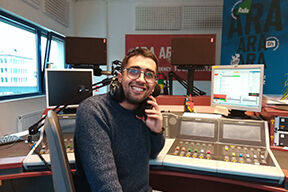
Luca Piparo
Radio producer and presenter of a weekly music show at Radio ARA in Luxembourg
"I feel that my work is now more efficient than before. Besides the technical and creative things, the skills I learned during my course gave me a professional method to do my work and a guideline on to how to critically evaluate radio and my work. I’d do another MA at BCU If I had the chance!"
Employability
Enhancing employability skills
The aim of our MA Media Production course is to prepare you for a career in the fast-paced world of media and broadcasting. Thanks to our outstanding facilities and reputation for producing work-ready, highly skilled graduates who are already proficient on industry-quality equipment, our students are sought after.
You’ll have worked with guest lecturers who are working within the industry and you’ll have gained good contacts during your course, all of which will stand you in good stead when looking for employment.
It is very useful to have an idea what you would like to do when the MA has finished. Ambition is strongly encouraged. We have a very experienced professional development team who have worked in the radio and television industries and are widely networked with professionals currently working in production.
An individual professional development plan is created with the help of staff and the practicalities of achieving professional goals is covered in detail. You will create appropriate CV’s and covering letters, mock interviews are offered and actively encouraged.
Placements
You are encouraged to find a placement or work with an external client while studying on the course. This is an ideal way to build your network, an essential element of working in the short-term contract, freelance structure of the television and radio industries.
Because we work with people across the industry – both in the UK and overseas – you might be offered the opportunity to work with global professionals and clients.
Students with an interest in television production will be able to apply for established placement schemes with Sky and the BBC Drama department in Birmingham. Many opportunities are connected with production activity in and around the city. For example, we work closely with Film Birmingham who appreciate the ‘industry ready’ abilities of our students and graduates. Recent films produced in Birmingham, which included paid placements for our students, include The Girl with All the Gifts, Kingsman 2 and Stephen Spielberg’s Ready Player One. The BBC also approach us regularly with opportunities including producing original content for BBC Three online and the BBC Sports Personality of the Year show.
Some of our radio students have partnered with American student radio stations to produce award-winning programmes.
Links to Industry
Film Birmingham recognise our ability to provide industry literate students who are regularly hired for runner and location assistant roles on productions shot in and around the city.
Local media companies Maverick (Embarrassing Bodies) North One (The Gadget Show, Guy Martin) and 7 Wonder (Make My Body Better with Davina McCall) regularly offer placement opportunities directly to our students and many of our graduates have been offered entry level paid work based on their voluntary engagement with these companies.
Our radio students have had the chance to work closely with local organisations such as the Library of Birmingham and the Birmingham Town Hall venue to create real world media as part of their course work.
Facilities & Staff

Our Facilities
When you join Birmingham City University, the first thing you will notice is the high standard of our campuses.
With an investment of over £400 million across our buildings and facilities, we are committed to giving you the very best learning environment to help shape your experience.
State-of-the-art facilities
You will learn in our state-of-the-art facilities - including the £62m fully-digital Media Centre - located on the City Centre Campus. You will enjoy access to extensive studio and workshop space including four TV studios, six radio studios and broadcast-standard edit suites, as well as cutting-edge equipment and software.
Facilities include the largest TV floor of any university in the UK, a ‘green screen’ and a BOLT JR+ high-speed camera robot.
An excellent team of tutors and technicians supports our production facilities. We actively encourage our students to utilise the facilities beyond the set course work to build up a varied portfolio of work.
You will have the opportunity to work with the composing students based in the Conservatoire and commission original music for a wide range of projects. Our animation and graphic design students are happy to work closely with our students to provide opening title sequences and the Film Production and Sound Engineering students help crew productions. The Arts, Design and Media faculty uniquely offers our production students the opportunity to ‘commission’ every element of television and radio production work from fellow students.
Our staff
Dr Sam Coley
Associate Professor, College Academic Lead for Distance & Transnational Education Course Leader MA Media Production
Sam Coley is the College Academic Lead for Distance and Transnational Education at the Birmingham College of English and Media. He is also Award Leader for the MA Media Production and teaches a range of undergraduate and postgraduate audio production modules.
More about SamDave Harte
Head of the College of English and Media (interim)
Dave Harte is Associate Professor in Journalism and Media Studies. His research is focused on local and community journalism, and he has published widely on these topics.
More about Dave